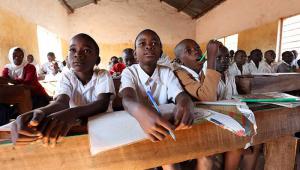By Nick Mann | 16 October 2012
There are ‘worrying signs’ that international aid for education is slowing down, threatening globally agreed goals for universal schooling and better skills, according to a United Nations report published today.
Putting education to work monitors progress towards six Education For All goals which were agreed by 164 nations in Senegal in 2000. They include providing universal primary education by 2015, which is also one of the Millennium Development Goals – a target the UN Educational, Scientific and Cultural Organisation report said was likely to be missed ‘by a large margin’.
The number of primary school age children out of school has fallen from 108 million worldwide in 1999 to 61 million, but the report noted that three-quarters of this reduction was achieved between 1999 and 2004. Between 2008 and 2010, progress stalled.
Improvements in early childhood care and education have also been ‘too slow’, the report said, while adult literacy remains an ‘elusive goal’, with the number of illiterate adults dropping by just 12% between 1990 and 2010.
Despite this, aid for education had stagnated at $13.5bn worldwide in 2010. Of that, aid for basic primary education totalled $5.8bn. The report noted that, while this was almost double 2002/03 levels, only $1.9bn of it was also allocated to basic education in low-ncome countries, far short of the $16bn education financing gap they face.
Highlighting the 3% fall in overall aid spending seen in 2011 – the first such decline since 1997 – Unesco warned that some aid donors might also be making education a lower priority. This would result in education spending falling faster than overall aid levels.
In particular, it cited the Netherlands, one of the top three education donors in the past decade, which is expected to cut funding by 60% between 2015 and 2015. ‘This could have serious implications in some of the poorest countries,’ the report said.
Pauline Rose, director of the Education For All global monitoring report, said: ‘There are worrying signs that aid to education may be slowing down just when children and young people need it the most.
‘Governments and donors must find the money and energy to help young people most in need to acquire the skills they and their countries’ economies desperately need. The private sector is the first to benefit from a skilled workforce and must also step up its financial support.’
The report advocated reallocation of aid to fill the funding gap. A total of $3.1bn of funding of post-secondary education never reaches the educational systems of developing countries because it is used to fund foreign students in donor countries.
This money, it said, could be better spent addressing the skills deficit for disadvantaged youth in poor countries.












